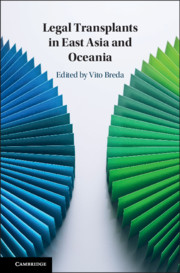Book contents
- Legal Transplants in East Asia and Oceania
- Legal Transplants in East Asia and Oceania
- Copyright page
- Dedication
- Contents
- Figures
- Tables
- Contributors
- Acknowledgements
- Table of Cases
- Table of Statutes
- Abbreviations
- Introduction
- Part I
- Part II
- 5 The Incomplete Legal Transplant – Good Faith and the Common Law
- 6 How Long Is Too Long to Determine the Success of a Legal Transplant? International Doctrines and Contract Law in Oceania
- 7 Proportionality in Australian Public Law
- 8 Legal Transfer and ‘Hybrid’ International Commercial Dispute Resolution Procedures: Lessons from the Singapore International Commercial Court
- 9 The Independent Lawyers’ Association of Myanmar as a Legal Transplant: Local Challenges to the Idea of an Independent National Bar Association
- Part III
- Index
- References
5 - The Incomplete Legal Transplant – Good Faith and the Common Law
from Part II
Published online by Cambridge University Press: 18 June 2019
- Legal Transplants in East Asia and Oceania
- Legal Transplants in East Asia and Oceania
- Copyright page
- Dedication
- Contents
- Figures
- Tables
- Contributors
- Acknowledgements
- Table of Cases
- Table of Statutes
- Abbreviations
- Introduction
- Part I
- Part II
- 5 The Incomplete Legal Transplant – Good Faith and the Common Law
- 6 How Long Is Too Long to Determine the Success of a Legal Transplant? International Doctrines and Contract Law in Oceania
- 7 Proportionality in Australian Public Law
- 8 Legal Transfer and ‘Hybrid’ International Commercial Dispute Resolution Procedures: Lessons from the Singapore International Commercial Court
- 9 The Independent Lawyers’ Association of Myanmar as a Legal Transplant: Local Challenges to the Idea of an Independent National Bar Association
- Part III
- Index
- References
Summary
This chapter will consider a legal transplant that is potentially still occurring – the broad recognition of notions of ‘good faith’ in relation to contracts. Whilst notions of good faith surround early conceptions of contractual relations, as will be seen, the common law, whilst initially apparently accepting good faith as part of the law of contract, set its face against such a doctrine, except in relation to insurance contracts. That resistance had been stoic for many years, until finally in recent years, the United Kingdom Supreme Court accepted the doctrine as a principle applicable to contracts, at least to some extent. In so doing, it followed in the footsteps of the Canadian Supreme Court, which finally recognized a general doctrine of good faith earlier in the same year. The doctrine is broadly recognized in the United States.
- Type
- Chapter
- Information
- Legal Transplants in East Asia and Oceania , pp. 111 - 131Publisher: Cambridge University PressPrint publication year: 2019

